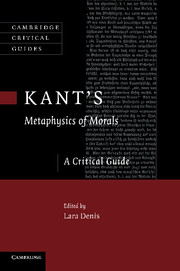Book contents
- Frontmatter
- Contents
- Notes on contributors
- Acknowledgements
- List of translations and abbreviations
- Introduction
- 1 Kant's Metaphysics of Morals: the history and significance of its deferral
- 2 Reason, desire, and the will
- 3 Justice without virtue
- 4 Kant's innate right as a rational criterion for human rights
- 5 Intelligible possession of objects of choice
- 6 Punishment, retribution, and the coercive enforcement of right
- 7 Moral feelings in the Metaphysics of Morals
- 8 What is the enemy of virtue?
- 9 Freedom, primacy, and perfect duties to oneself
- 10 Duties to and regarding others
- 11 Duties regarding animals
- 12 Kant's Tugendlehre as normative ethics
- Bibliography
- Index
5 - Intelligible possession of objects of choice
Published online by Cambridge University Press: 10 January 2011
- Frontmatter
- Contents
- Notes on contributors
- Acknowledgements
- List of translations and abbreviations
- Introduction
- 1 Kant's Metaphysics of Morals: the history and significance of its deferral
- 2 Reason, desire, and the will
- 3 Justice without virtue
- 4 Kant's innate right as a rational criterion for human rights
- 5 Intelligible possession of objects of choice
- 6 Punishment, retribution, and the coercive enforcement of right
- 7 Moral feelings in the Metaphysics of Morals
- 8 What is the enemy of virtue?
- 9 Freedom, primacy, and perfect duties to oneself
- 10 Duties to and regarding others
- 11 Duties regarding animals
- 12 Kant's Tugendlehre as normative ethics
- Bibliography
- Index
Summary
INTRODUCTION
Kant's main problem when discussing private law in the Doctrine of Right is justifying why individuals have a right to have external objects of their choice as their own. The original innate right to freedom from coercion by others does not give us the right to have external objects of choice as our own. The original innate right to freedom is the right we have to move around without restriction with our own bodies, our bodies being inextricably attached to ourselves. Why is it that we have a right to things external to ourselves? Indeed not only a right to pick up and use them, but a right to put them down and expect no one to take or use them when we leave them?
Kant's inquiry is more far-reaching than perhaps first meets the eye. Kant asks his questions not simply for physical things, but for any object of choice. An object of choice is something external to me that I have the ability to use, namely: (1) a physical thing (including animals), (2) someone else's freedom of choice to perform an act, and (3) someone's status in relation to me (RL 6:247:18–21). Kant's discussion thus includes not only rights to property but also contractual rights and family rights. Kant divides his discussion of rights to external objects of choice into one general part and three specific parts. The general part is devoted to explaining what it means to have something as mine.
Keywords
- Type
- Chapter
- Information
- Kant's Metaphysics of MoralsA Critical Guide, pp. 93 - 110Publisher: Cambridge University PressPrint publication year: 2010
- 3
- Cited by

